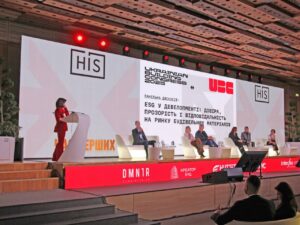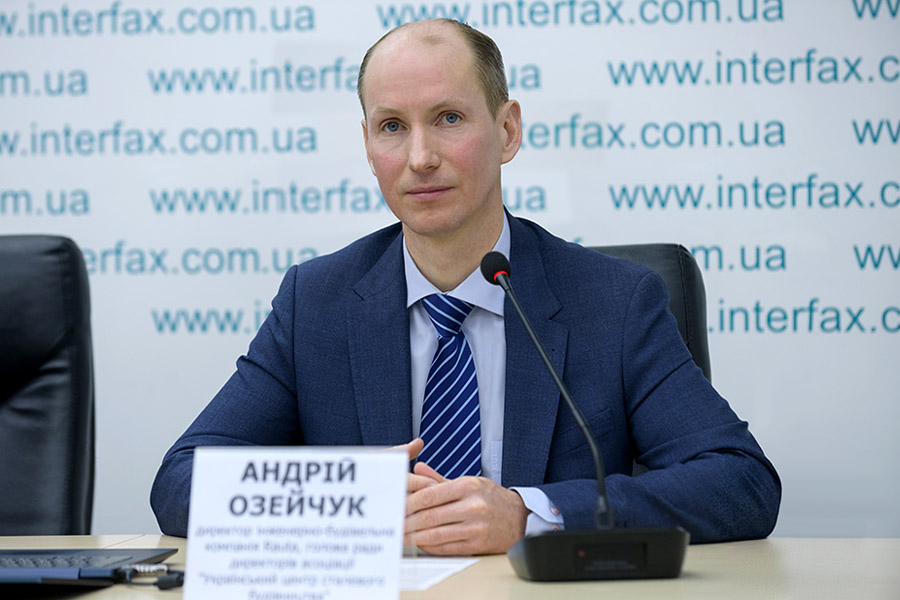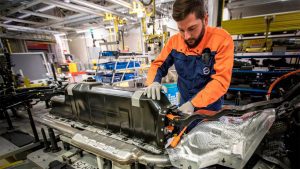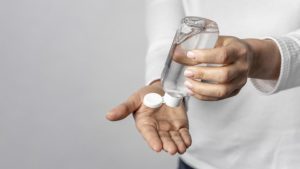
Engineering and construction company Rauta will launch sandwich panels, ventilated facades, and roofing materials made from “green” steel on the Ukrainian market next year, Rauta Director Andriy Ozeychuk announced during a panel discussion at the 5th Ukrainian Construction Congress in Kyiv on Friday.
“In 2026, Rauta will launch sandwich panels, ventilated facades, and roofing materials made from ‘green’ steel, which is produced using hydrogen, electricity, and biogas instead of fossil fuels. The residual product of this production process is not carbon dioxide, but water,” he said, citing an example of the company’s implementation of ESG principles (Environmental, Social, Governance – environmental, social and corporate responsibility).
According to him, the use of “green” steel, in particular, will significantly reduce the amount of embodied carbon and increase the number of points when certifying a building according to the LEED and BREEAM environmental systems.
Rauta systematically implements key ESG principles in its activities, because a transparent corporate culture and reputation are important to the company’s customers. “The projects implemented by our company always incorporate solutions that comply with ESG principles. For example, the Energy series’ airtight technology and sandwich panels reduce operational carbon and increase the sustainability of the facility,” says Ozeychuk.

In 2022, Rauta was the first in Ukraine to introduce Environmental Product Declarations (EPDs) for building envelopes. The company is also actively involved in social projects: it partners with architectural competitions, provides grants for training young architects at InLab and Plus Minus schools, has set up a training stand in a specialized energy conservation auditorium at KNUSA, and has launched an educational project on sustainable design.
The expert noted that the advantage of steel solutions for the customer is the speed of project implementation and the ability to create large-span spaces. If necessary, steel frames can be relatively easily relocated or 100% recycled as scrap metal, which significantly increases their value for the customer compared to reinforced concrete solutions.
Ozeychuk stated that European construction customers implementing projects in Ukraine are not only willing to pay for steel solutions, but also often insist on the use of more environmentally friendly and energy-efficient materials.
“This is due to a more conscious attitude towards ecology and construction experience in the EU, where the European Energy Performance of Buildings Directive (EPBD) is in force, which sets requirements for improving the energy efficiency of existing and new buildings, which directly affects the criteria for selecting materials. Unfortunately, Ukrainian construction customers mainly look at low prices rather than environmental or quality characteristics,” he said.
According to his forecast, if Ukraine implements the European Directive, the demand for materials with better thermal and environmental characteristics will increase. “This will increase competition between Ukrainian and European manufacturers and force the former to invest in modern production processes to improve the environmental friendliness and energy efficiency of their products,” Ozeychuk believes.
Rauta is a leader in the Ukrainian steel construction market and a member of the European Construction Industry Association. The company provides design, manufacturing, and installation solutions in accordance with current EU standards. The company is licensed to perform construction work with medium and significant consequences (CC2, CC3). According to the Unified State Register, Andriy Ozeychuk owns 100% of the company’s authorized capital.

Megatex LLC (Konstantynivka, Donetsk region), the manufacturer of batteries from used batteries, has asked President of Ukraine Volodymyr Zelensky to help solve the problem of legalizing the purchase of recyclable materials.
“We produce accumulator batteries from used batteries, and now when buying recyclable materials (any), a company engaged in cashing money flows is at the end of some link, while the plants recycling this raw material take the punishment from the tax service and prosecutor’s offices. If this is brought to the legal business, the government will receive UAH 4-5 billion of additional receipts,” Head of the company Yuriy Shapran said during a meeting between the president and business representatives of Khmelnytsky region on Wednesday, June 3.
In his opinion, a solution of this problem could be a tax of 3-4%, which the processor would pay for the supplier of raw materials.
“If buyers of recyclable materials pay a tax of about 3-4% for the supplier, then this money will go to the budget. Today, I can frankly say this, this is the cost of the services of cashing companies and it will be easier for business to work, it will not spend time on all these troubles with the law,” Shapran said.
He said that in this case there will be no avoidance of identifying a supplier, which the EU is opposed to.
“We identify him (the supplier), but we pay this tax for him and then he is free, he is honest. The company paid the tax for him and it will not require any additional taxes afterwards,” Shapran said.
In addition, he considers it necessary to cancel the payment of a 5% import duty on recyclable materials for the production of batteries.
“We import raw materials from abroad, and we have a 5% duty, while there is no any duty on other raw materials. We have very low margin, so it is very difficult,” the head of the company said.
He also said that the company is ready to work, it has prospects and more and more foreign partners (it exports 75% of its products), and it is also ready to increase production volumes.
“There were problems under the previous government authority, namely Vesta plant in Dnipro, where former MP Dzenzersky [Denys Dzenzersky, MP of the seventh convocation] worked completely off the books. They were bankrupt, but they worked and the tax service did not come there, while we were unprofitable for four years,” Shapran said.
“That is, there are two problems, namely, to legalize the purchase of recyclable materials and remove the import duty on raw materials,” he said, providing Zelensky with the prepared materials.
Since 1993, Megatex LLC has been producing various lead alloys and is engaged in the production and maintenance of accumulator batteries, their purchase and recycling.

State-owned enterprise Ukrspyrt has produced and supplied 3.3 million liters of raw materials for antiseptics to Ukrainian companies within three weeks from the start of production.
“Over three weeks, Ukrspyrt delivered 3.3 million liters of disinfectant to manufacturers. If we mathematically transfer this to products, then approximately 85 million pocket sanitizers of 50 ml or 17 million of 250 ml can be made from raw materials sold by Ukrspyrt,” the state enterprise said.
Today, raw materials are shipped from 12 Ukrspyrt plants.
“For efficiency, over the past few weeks we have additionally launched two plants in Lviv and Cherkasy regions,” acting director of Ukrspyrt Serhiy Bleskun said.
According to him, now 36 Ukrainian producers of antiseptics are buying raw materials at Ukrspyrt.
As reported, on March 30, the Verkhovna Rada voted for bill No. 3275, which, among other things, allows the manufacture of disinfectants (raw materials for antiseptics) at Ukrspyrt factories, and the president signed the law on April 2.